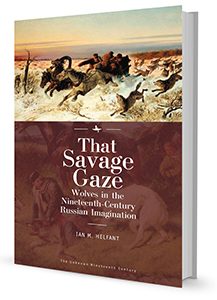 That Savage Gaze: Wolves in the Nineteenth-Century Russian Imagination
That Savage Gaze: Wolves in the Nineteenth-Century Russian Imagination
By Ian Helfant, associate professor of Russian and Eurasian studies and environmental studies
Academic Studies Press, 2018
That Savage Gaze is written with pace, fervor, and detail. Using extensive fictional and nonfictional sources, Ian Helfant addresses the preeminent role played by large populations of wolves in Russia’s conceptualization of itself as an emerging nation in the 19th century. People of that time demonized wolves, and hunters purposely sought to slay as many as possible. After all, ferocious wolves in 19th-century Russia recurrently killed people, particularly children. Helfant argues that the Russian “wolf problem” was a vital factor in the development of the country’s social, cultural, and historical character during this time.
Eventually this nefarious mind-set changed as Russians developed an understanding of the ecological essence of the natural world, including wolves. The humans found an integrated truth of “our own identities and our understandings of the beings that surround us.” What Helfant uncovered is a paradox that is revealed by “that savage gaze” — moments when the eyes of the wolf are interlocked with the eyes of a human. Suddenly, everything segues into a whole. There is no good and evil, no right or wrong, no reason or logic. In that state of mind, a person acquires an omniscient view of the world, witnessing the complex integrity of the everyday. Such deep animal-human experiences led Russia to a slow, yet persistent transformation, and wolves became an icon of sorts, providing a source of national identity and pride. Thus, nature, society, and culture self-organized and emerged as a deeply integrated, paradoxical truth of Russia’s animal-human experiences.
That Savage Gaze is a fascinating, masterly controlled journey through aspects of 19th-century imperial Russia that both delights and enlightens.
